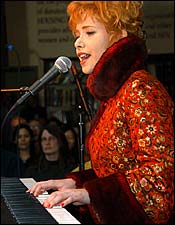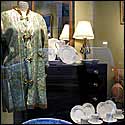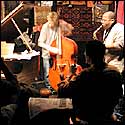
When I walk into Nellie McKay’s underheated Harlem studio, she’s listening to an old Peggy Lee album, bought for 99 cents. It seems like a setup, except that the walls are covered in photos of prewar legends, and her mind is full of their images, too.
“As a kid, everything about me was weird,” she explains over fruit salad (McKay’s been vegetarian since age 8) at a nearby café. “I was always imitating Ann Sheridan, wearing a little military cap, or Rosalind Russell in Take a Letter, Darling. I read biographies of Dietrich, Hepburn, Garbo—all of them. Of course, nobody at school understood. Nobody even knows who Rita Hayworth is anymore. Are they nuts?”
She changes topical lanes every few seconds, swerving from Eminem (anti) to Bob Dylan (pro) to Rupert Murdoch (anti) to Susan Sarandon (pro) in a dizzying game of mental tag that often ends in the bewildered question “What was I saying?”
Possibly the only New York musician signed to a record deal last year whose press kit doesn’t include the term “post-punk,” she’s 19, mouthy and droll, shockingly talented, and vividly recherché in a way that evokes Turner Classic Movies. McKay (it rhymes with “not shy”) writes exhaustingly inventive jazz-pop tunes about marriage and seduction, with references to George Bush, Ethel Merman, and Dr. Phil. Her choruses are laced with outrageous rhymes, tart feminism, and leftist politics, and she crashes assonances together like a teen Cole Porter with a case of Tourette’s: “I don’t know, son, was there something I missed / I don’t think Fritz Lang was a fantasist / Metropolis exists / Is this / If you listen close, you can hear the piss.”
Since the release last month of her first CD, Get Away From Me (typically, the title is a bad-seed answer to the welcoming name of Norah Jones’s smash Come Away With Me), the reviews have been unanimous. In the New York Times, Jon Pareles called her “a sly, articulate musician who sounds comfortable in any era.” “Brave, brash, brilliant, and maybe a little batty,” raved the Philadelphia Daily News; the Washington Post declared that “this supremely gifted, charming, and darkly funny New York oddball has all the makings of the first great singer-songwriter of the young century.”
Born Eleanora Marie McKay, she was raised by her mother, Robin Pappas, a very theatrical actress (that adjective may seem redundant unless you’ve met her). After a spiteful divorce from Nellie’s father, a British director and writer, Pappas raised her only child in Harlem, until Nellie was mugged at age 10; they packed a VW van with their dog and nine cats and moved to Olympia, Washington, and later to rural Pennsylvania. In a high school with its own gun club, the girl with curlers in her hair and shoulder pads was a lonely freak. Mother and daughter were poor, and McKay recalls huddling in the kitchen to watch TV when a landlord had turned off the heat.
“I’ve got a lot of crazies in my family,” she says. Her maternal grandfather, she says, was a “psycho” who beat his wife and hit another daughter with a dog leash. “He’d take dogs into the woods and shoot them for target practice.” Hearing about all this from her mother steered her toward feminism. “I even have less sympathy for homeless men, just because they never have periods. What do homeless women do? Those poor women.” She shakes her head. “There’s a side of me that identifies with Aileen Wuornos.
“My father broke my mother’s nose twice before she left England,” she adds. “He’d really like to ‘get to know me better,’ but I haven’t responded to him for the last six months. I just can’t stand him.”
McKay pauses over a strawberry, laughs self-consciously. “Why do I keep saying like?” she says with a sigh, and requests that the word be dropped from her quotes. “I don’t want to sound anything like people my age,” she roars.
After a childhood that included visits from Abbie Hoffman (her mother made friends with him in Haight Ashbury), her mode of rebellion was to head for the squarest of eras. She listened to Dinah Shore’s “Laughing on the Outside (Crying on the Inside)” on the way “to and from school, every day,” she says. Shore, Doris Day, and Jo Stafford became her honorary aunts. At night, instead of doing homework, she watched Access Hollywood, studying fame.
At 16, she moved back to New York and enrolled at the Manhattan School of Music, to study jazz voice. But studying bored her, as did anything that didn’t lead straight to fame, including her first job, working nights at Gristedes. “It lasted three weeks. I realized how deadening and stupid that is, because you’re not making any money—you’re just going to hell.”
She quit school after two years, worked as a stand-up comic, and played show tunes in gay bars. She wrote her first song, and then—like something out of a Rosalind Russell film—within a year, the world knocked at her door. Even as she played to 75 people in a Williamsburg club, record labels vied for her hand. “I was crazy about her,” says Ron Goldstein, president and CEO of Verve, who tried to sign her. “Nellie lives in her own world. There’s a sense of innocence in her music that I hope will last.”
The bidding was won by Columbia, a division of Sony and the home of Dylan and Springsteen, and she began recording with Geoff Emerick, who engineered the Beatles’ Revolver, Sgt. Pepper, and Abbey Road, and also produced Elvis Costello. “I get sent lots of demos, and Nellie’s was a breath of fresh air because of how stagnant the business is now,” says Emerick, a fidgety, ginger-haired, potbellied man of 58 in cargo pants. “Because of the sophistication in the songs, I didn’t believe that she was a teenager.”
In the midst of recording her CD, McKay decided she wanted to make it a double CD—eighteen songs. Sony (whom she sometimes calls “the enemy”) fought her, even trying “to confiscate the tapes,” she maintains. She paid $30,000 of her own money to record five more songs. The more people warned her not to release a two-disc debut, the more she dug in. “People don’t understand teenagers. The only way you’re going to get your kids to not do drugs, if that’s your goal—which I don’t understand, because a lot of drugs are good for you—is to do drugs around your kid, which my mother did. She smokes pot, and I’ve never wanted to. I can be difficult—I take out my neuroses by punching things. That doesn’t sound very female, does it? There’s more than a little Sean Penn in me. There’s a lot of fury in me.”
There wasn’t a lot of fury in Doris Day, which is why McKay’s retro costumes and golly-gee lingo create a misleading first impression. Here are a few targets from this PETA activist and self-described “angry teenage Albert Schweitzer”: conformists, including anyone who wears Old Navy; Madonna, for exploiting sex (“Why is that the only way you can push buttons?”); Columbia University, for the animal testing in its labs; and jazz musicians who dismiss her signing as luck.
“I can be difficult—I take out my neuroses by punching things. That doesn’t sound very female, does it? There’s more than a little Sean Penn in me. There’s a lot of fury in me.”
She also struggles with stylists who want typical “sexy” photos. “I definitely want to expose less flesh. I’ve read Linda Lovelace’s autobiography—I know where that road leads. I don’t mind being a sex symbol, but I’ll go the Garbo route, thank you very much. Why don’t men take their clothes off in photos? Because it makes them vulnerable, and men don’t like to be vulnerable.”
McKay’s sharpest song, the lounge ballad “I Wanna Get Married,” mocks domesticity as a trap (“I wanna pack cute little lunches for my Brady Bunches / Then read Danielle Steel”), and beneath its swingy pace, “It’s a Pose” is an indictment of men for warmongering, rape, and porn. The college dropout often sounds like a campus feminist: “If blacks loved white people like women love men, we’d still have slavery. Women are in love with the oppressor.” Especially white American men. “I’m so tired of white people. Black people were enslaved for so many years, yet they live among us and don’t kill us all. That blows my mind! We have the equivalent of a pinprick in the World Trade Center tragedy, and we’re going nuts. We can’t take it. So I do have a problem with white people, because I feel that not only are they currently the world oppressors, but they’re big babies on top of it.” A few minutes later, she adds, “You won’t make me sound too self-righteous and angry, will you?”
McKay, who admits she likes to “stir shit up,” and shows a teen distaste for authority, whether it’s Sony or her mom, is trying to end her relationship with Lach, the one-named manager who first saw her at an East Village open-mike night, when she had only one song. “He was swindling me,” she charges. “I knew he was a shyster, but I thought it was for me. He was taking too much credit, too much control.”
Replies Lach: “I have no idea whatsoever how she thinks getting her a deal with Columbia and setting her on the path to stardom is swindling her. I’m dumbfounded.” Though a source says he and McKay are suing one another, Lach declined to comment on that: “I’m still legally and contractually her manager,” he says.
As she has for much of her life, McKay spends much of her time with her mom. “I don’t believe in dating. I’m saving it all for one person,” she says, blushing. She’s referring to her neighbor, David, who taught her at Manhattan School of Music. He’s the subject of “David,” the bereft first song on her CD. “From the first day I laid eyes on him, I knew he was the one for me,” she says, glowing. There are a few little impediments to their union: He has a girlfriend, and anytime Nellie is around him, she turns mute.
“You can’t make someone like you,” she philosophizes. “You can only get rich and famous and hope they can’t help themselves. Eventually, it should happen. Otherwise, I’m quite happy to be the Virgin Queen, because it gives you a great place of power. Frankly, I think I’m here for a higher calling.”
At the end of the meal, trained by years of struggle, McKay fills a plastic bag with leftover fruit salad, grapes, and bread. Nearing her building, we bump into her beloved David. Quickly, she enlists me in a ruse—at her instruction, I walk her to the door, pretend to laugh at something she’s said, and loudly announce my departure—so David will know I’m not spending the night.
Nellie McKay’s New York

Neighborhood: “Harlem. I’m very happy here. But I wouldn’t mind having an apartment with a closet.”
Shopping: “Appletree Supermarket on 120th and Amsterdam. They’re nice, and they have InTouch magazine. I do quite like Betsey Johnson, but it’s a little Hilton-sisters for my taste. Her clothes have sequins, they’re clingy—they just make you feel like Ann-Margret. And I like Housing Works on 17th Street. It’s a thrift store, but rich people donate to it, and they only wear their clothes, like, once, so you can get really nice stuff there. Oh, and I like the candles at Duane Reade.”
Music: “I used to buy records at Colony, but then this guy who works there got my phone number, and he kept bugging me. He works from noon until close, so the only way I can go is if I go in before noon. If I need one song, I’ll go online and copy down the chords. I did that with [John Lennon’s] ‘Woman Is the Nigger of the World,’ which I did at the Bottom Line, before I knew NYU was going to close it. It’s very sad.”

Club: “Fat Cat on Christopher is run by the same guy that ran Small’s. It’s got a really nice atmosphere, and couches and shit. I gave him some money to make it better, because I was so devastated when Small’s closed. But I can’t go there anymore because people know me, and I just feel like everybody wants a job.”
Food: “I like the vegetable dumplings at Zen Palate, and the vegetarian soul chicken at Vegetarian’s Paradise 2 on 4th Street—it’s just like Popeye’s, it’s terrible for you! I hate fancy places. I hate waiters standing over you—you can sense how much they hate you. If the record label really wanted to wine and dine me, they’d just take me to McDonald’s for a veggie burger and fries.”
Movies: “The place I most frequent is Film Forum. It can be annoying, but they have good carrot cake there. I go to Lincoln Plaza, Anthology Film Archives, and for three weekends in a row, I went to Landmark Sunshine Cinema.”